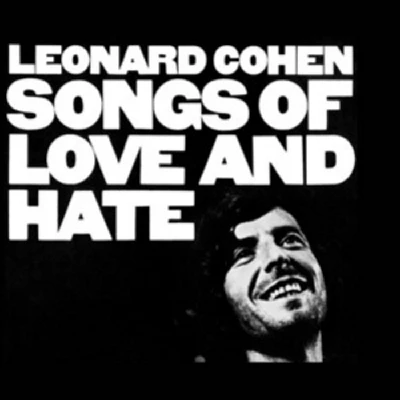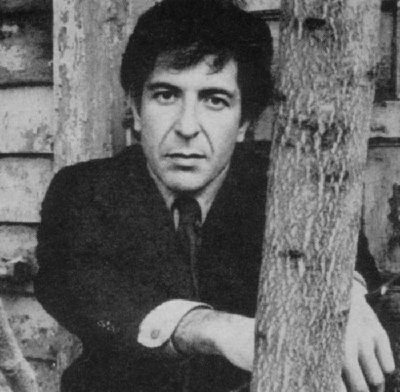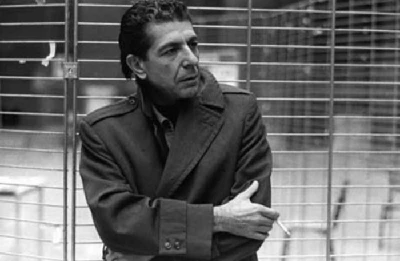published: 22 /
5 /
2009

Jeff Thiessen examines Leonard Cohen's raw, emotionally traumatised 1972 album, 'Songs of Love and Hate'
Article
“That which is slightly distorted lacks sensible appeal: from which it follows that irregularity – that is to say, the unexpected, surprise, and astonishment, are an essential part and characteristic of beauty”
-Charles Baudelaire
I live in Saskatoon, Saskatchewan, a city in Western Canada that has the distinction of not only being the murder-capital of our fine country, but the ninth most dangerous city on the planet, sandwiched squarely between London (10th) and Norilsk (8th). This is according to a study conducted by Realworld.com, which apparently is a fairly well-known global news and commentary site.
For the record, I must clarify my town is not one that contains any landmines, suicide bombings, or military intervention to halt ethnic cleansing, and personally, I have neither been a victim of, nor witnessed any of the types of malicious crimes that would warrant such a nefariously high world ranking. Neither have nearly all of my fellow citizens, but that hasn’t stopped my idiotic prairie community from embracing this title as proudly as Alabama hoists that Skynyrd song for their state anthem. I have seen bumper stickers boasting of this ‘accomplishment’, and now all of a sudden, everyone walks around like we’re living in some anarchic DMZ where chaos reigns supreme, and morality/common sense places a very distant second to hedonism and a surrender to our most primal, brutal instincts that allows no room for rationale; only crude survival.
Frankly, we’re not all that bad, and nothing has really changed except maybe giving some housebound wino’s some twisted sense of looming danger that might put a dent in their hum-drum suburbanite ennui. Hey, if it stops them from banging the local sports editor of our city’s newspaper, I guess maybe the article wasn’t all bad.
Honestly though, the whole thing stinks, but it has gotten me thinking a lot. Not about my surroundings, because I have zero worries there (I used to walk down the most treacherous street in the city on my way to, and from work, for months. Many times this was with headphones on, often late at night, sometimes shitfaced. My NFL gambling resume speaks for itself. I am not a lucky individual, so spare me the hardcore theatrics evoking the visuals of the recent 'Doomsday' flick when discussing my fair city, I’m not buying any of it). Instead, I started to realize that this moronic study has finally given our city an identity we can latch onto, and judging from the incredibly notorious nature of this title, it’s a safe bet we were willing to settle for basically anything. Everyone wants to be a part of something bigger then themselves, even if that includes proudly buying butterfly-knife air fresheners, so it looks like we have our bigger picture. Unfortunately for us, it’s a blood-soaked Pollock. Only thing is, the people only want to frame the revulsion. I don’t know, maybe it’s a prairie thing.
The notion of self-concept, or actually the absence of one and the unyielding conquest towards all the strongest human emotions under the most strained of circumstances defines the entire 1971 Leonard Cohen album, 'Songs of Love and Hate'. Like my hometown was before this study, Leonard wasn’t really sure who he was as the seventies rolled around. He was a shadowy man that looked, and sounded, like he just spent six full days at the bottom of the ocean. Bombastic groups like Led Zeppelin and the Eagles ruled the charts, and if you read any interviews with Cohen around that time, it was pretty obvious he wasn’t too sure how much pull poetic justice really had by this point. Maybe he was right. I don’t have the sales figures with me, but considering horse slop like 'Desperado' was running the table around that time, I think we can agree it’s sort of a moot point. What is important here, is 'Songs of Love and Hate' is without question, one of the most powerful musical masterpieces of the modern age, and it was no trick of the heart.
The title of the album should not be interpreted as an exploration of two polar human emotional extremes, nor does it bother doing anything coy and get all existential on our asses by questioning the metaphysics of such notions or the proliferation of the species. No, there is none of that sort of garbage (we’ll leave that to Ed Kowalczyk). Instead, its main theme is intolerance; Cohen simply has no time for those who fail to see a neutral territory between the two polar opposites with the occasional glimpses of both as a valid form of human existence.
Not only that, on 'Songs of Love and Hate', he reminds us that sometimes romance can be brutal, and perhaps more importantly, sometimes hatred is the only thing we can reasonably expect to make us feel alive. This outlook isn’t nihilistic, well not in the right hands. It’s just pragmatic and, by the time the album is finished, you’ll see the halcyon isn’t a linear line; it’s just a blurred terrain where the victors are those who figure out control isn’t only a delusion, but psychosis, a bone machine that has the facility to grind and churn us into dust or hoist us on ivory towers into glory behind the sun. 'Songs of Love and Hate' acknowledges the infinite power of this world, but optimistically, everything seems an arms-length away. At least it seems that way when I hear that gravelly baritone that Cohen calls a voice – I call it a sound that comes from a hundred lifetimes that have come and gone.
It’s tough for me to believe this album was recorded in a studio. Records like this can’t be made in some ash-tray filled barn with a mixing board, something this intimate and heart-rendering had to have been made in a Mexican village like Zacatepec, far removed from any external factors that so commonly pollute the purest of offerings. That’s the thing though. It does exist in the prism of this bleak netherworld we inhabit, and more importantly, it was created in the matrix. It’s not really music that is confessional in the traditional sense. Instead, Cohen is a conqueror, mainly in the sense he can exert near total control over the tiniest of spaces. We hang on every word on Songs of Love and Hate, not on suspense really, but because we strive to discover the music to a point where we can feel and absorb his breath’s imprint on our bedroom window between all of his fateful words. Take 'Avalanche' for example, which to me is one of the most powerful pieces of music my eardrums have ever lent their time to. About halfway through the opener, Cohen asserts:
“When I am on a pedestal,
You did not raise me there.
Your laws do not compel me
To kneel grotesque and bare.
I myself am the pedestal
For this ugly hump at which you stare”
You see, this world Cohen is bringing us into is an ugly one, but it’s all we got, and that is one of the most liberating messages I have ever heard on a record. Truly, this is an absolute pure offering of free will, which essentially gives us the tools and freedom to perceive beauty as shite, and rottenness as something to potentially treasure. In between all this, there is no room for neutrality, as Cohen slashes through apathy like some drugged out prodigal son returning home who ceases to notice (or care) how nothing seems to be where he left it.
I initially found the line “There are no letters in the mail box” in the track 'Diamonds in the Mine' one of the saddest lyrics I had ever heard, but I was missing the point. The perpetual dive is not some big comedown. It’s just the key is no longer under the doormat. We’re never quite sure how long Cohen has been gone. It really could be anywhere from a minute to a year, but the point of all this is duration of absence can serve as a literal, utilitarian identity that doesn’t need to rely on cheap sentiment or miscreant offerings. He doesn’t really know who he is on 'Songs of Love and Hate', but that’s never seen as a problem, instead as a journey, and this is the sound of a man scraping out the bottom of his heart. It is only recently I have begun to recognize Cohen as a revolutionary, both in word and deed. Nobody can move a fucking stone in his world without him knowing about it a half hour later.
Leonard Cohen really is the Canadian Slumdog Millionaire. Nobody really knows how he has this arcane glimpse into the living universe, and much like Van Morrison, his biggest followers are the ones who surrender to this, not question it. To me the impact this record is capable of is basically unrivalled, but the legacy of 'Songs of Love and Hate' is debatable. In hindsight though, I’m reminded of the punk slogan in the late seventies, which was “No more Stones in 1977!”. Perhaps I’m being naive or an idealist here, but I’m going to choose to believe all those mohawked kids didn’t really care about the Sex Pistols or the Clash. Instead it just took them five years to get around to listening to 'Songs of Love and Hate', and 'Moonlight Mile' might be evanescent as hell, but you know, we really can’t do much with something like that, can we ?
What’s that Ramones song called again, 'Today Your Love and Hate, Tomorrow the World ?' Something like that.
Track Listing:-
Band Links:-
http://www.leonardcohen.com/
https://www.facebook.com/leonardcohen
https://www.youtube.com/user/LeonardCo
http://www.vevo.com/artist/leonard-coh
Picture Gallery:-


Visitor Comments:-
|
|
189 Posted By: Brad , saskatoon on 14 Jun 2009 |
Saskatoon is a scary town. And yes Ed Kowalczyk is a fruitcake
|